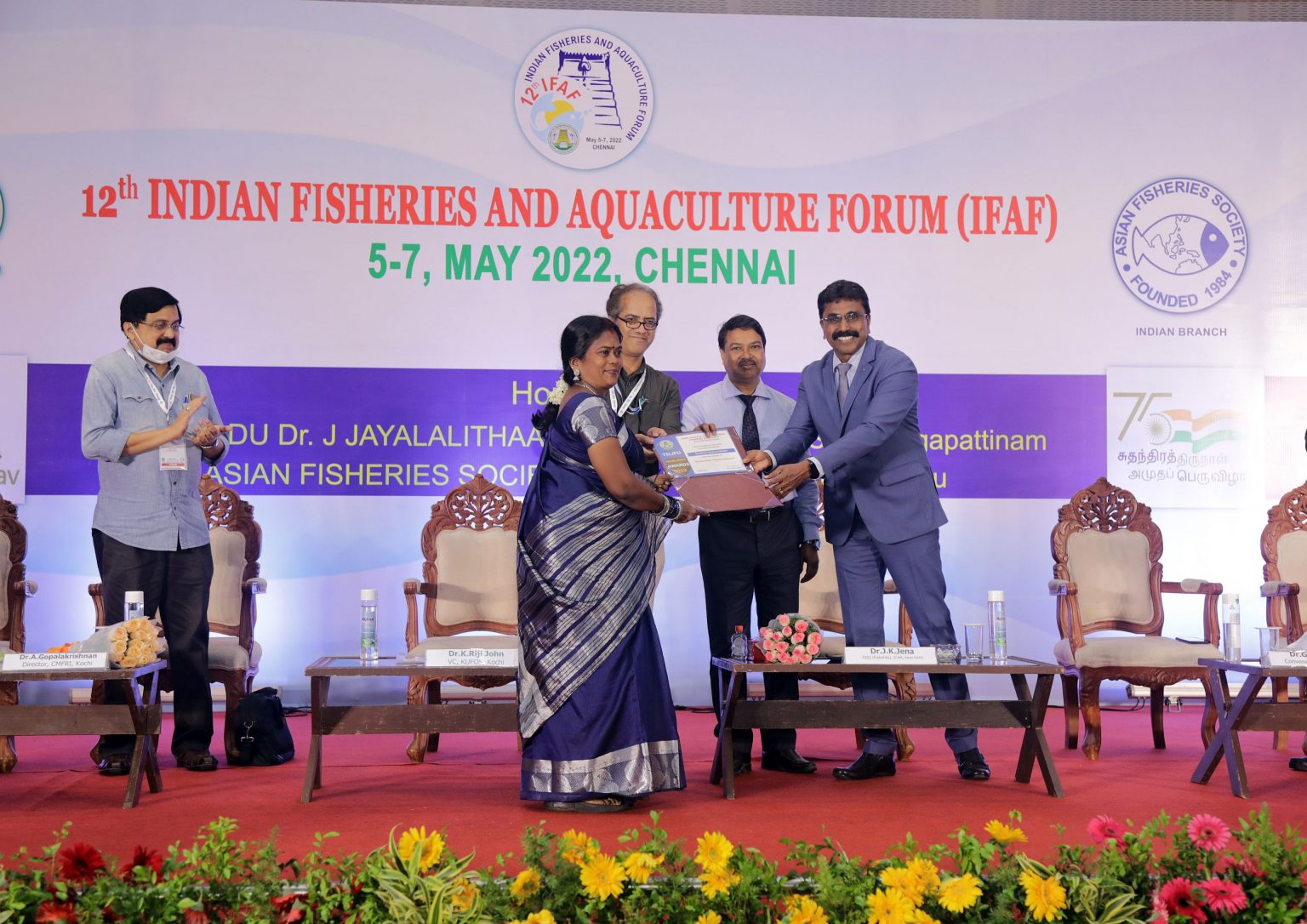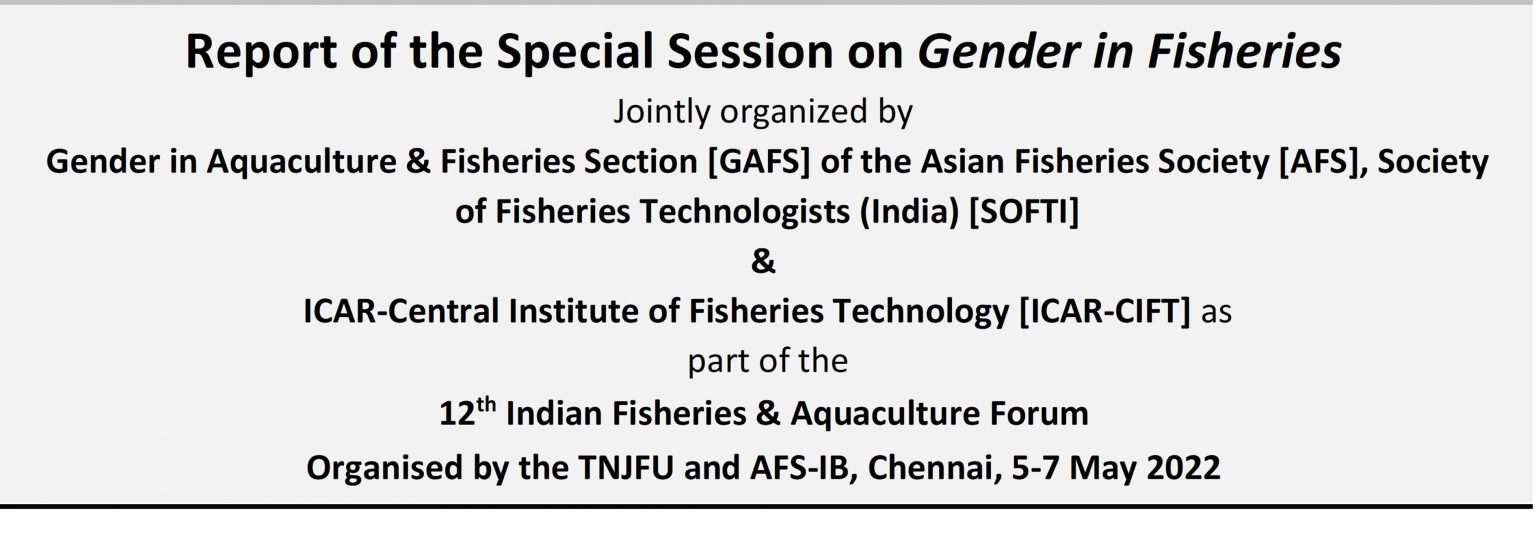The 12th Indian Fisheries and Aquaculture Forum (12IFAF) was held in Chennai from 5 to 7 May 2022. We are pleased to report on two events with special relevance to gender in aquaculture and fisheries. The first is an award to a gender stalwart, Dr B. Shanthi, and the second is a report by Dr Nikita Gopal of the Special Session on Gender in Fisheries held at 12IFAF.
TNJFU Excellence Awards – 2022
The Tamil Nadu Dr. J. Jayalalithaa Fisheries University (TNJFU), Nagapattinam, Tamil Nadu, India, and the Asian Fisheries Society Indian Branch hosted the Indian Fisheries and Aquaculture Forum (IFAF) from 5 to 7 May, 2022 in Chennai. The theme was “Fish for Nutritional Security and Economic Sustainability.” In this forum the “TNJFU Excellence Awards – 2022” were constituted and will be awarded every year on the occasion of a fisheries event or programme. Under Category-II of the Awards for Individuals and Professionals, we are delighted to report that Dr. B. Shanthi, A.R.S., Principal Scientist, Social Sciences Division of ICAR – Central Institute of Brackishwater Aquaculture, Chennai was awarded the TNJFU Excellence Awards – For Best Scientist – Fisheries Extension. The Award was for her research experience in the field of Gender Studies and Aquaculture Extension among Coastal Women and Tribal People in the Aquaculture Sector. She received this award from Dr. G. Sugumar, Vice-Chancellor of TFJNU in the presence of Dr. Joykrushna Jena, Deputy Director General (Fisheries Science), ICAR.
Congratulations to Dr B. Shanthi.
See these Stories on Dr B. Shanthi’s work: “Mrs Usha becomes a community leader through aquaculture,” and “Dedicated extension scientist and team win Outstanding Interdisciplinary Team Award.”



By Dr Nikita Gopal
Chair, Special Session in Gender in Fisheries (12IFAF); Principal Scientist, ICAR-Central Institute of Fisheries Technology, Cochin; and Vice Chair (now Chair), GAF Section of the AFS
A Special Session on Gender in Fisheries was organised as part of the 12th Indian Fisheries & Aquaculture Forum organised by the Tamil Nadu Dr. J. Jayalalithaa Fisheries University (TNJFU) and the Asian Fisheries Society- Indian Branch (AFS-IB) from 5-7 May 2022 at Chennai, Tamil Nadu, India.
The Special Session was held on 5th May 2022 [4.00-6.00 pm] and was jointly organized by Gender in Aquaculture & Fisheries Section [GAFS] of the Asian Fisheries Society [AFS], Society of Fisheries Technologists (India) [SOFTI] and ICAR-Central Institute of Fisheries Technology [ICAR-CIFT].
The following papers were presented at the Special Session:
- “Gender and Labor in Fisheries 101,” presented by Arlene Satapronovit, Project Manager, USAID Sustainable Fish Asia Local Capacity Development Activity (recorded presentation) [Lead Talk, International]
- “Mainstreaming Gender in Aquaculture & Fisheries,” presented by Nikita Gopal, Principal Scientist, ICAR-Central Institute of Fisheries Technology, Cochin [Lead Talk, National]
- “Gender analysis of wild seaweed harvesting in Tamil Nadu,” presented by Ahila M.S., ICAR-Central Institute of Fisheries Education, Mumbai
- “Women seaweed growers of India – Exploring the intersection of farm and household dynamics at play,” presented by Swathi Lekshmi P. S., Vizhingam Research Centre of ICAR-Central Marine Fisheries Research Institute
- “Women’s roles and challenges in diverse fisheries activities,” presented by V Geethalakshmi, Principal Scientist, ICAR-Central Institute of Fisheries Technology, Cochin
Arlene Nietes Satapornvanit and Meryl J Williams, observe that a lack of clarity and consensus on basic terminology related to gender and labor, and women working in fisheries could lead to women’s invisibility, lack of recognition and acknowledgement of their existence and contribution in the sector. Towards a common understanding on gender and labor in fisheries, they defined some basic terms commonly used when applying a gender lens to activities in fish value chains, fisheries statistics, policies, and interventions. It is important to consider labor along the whole fisheries value chain, since some interventions may focus only and collect statistics for, on just the production node (of fishing and fish farming). This ignores the other nodes where labor typically engages more people, and most specifically where women are involved more. A discussion on various types of work that women do in and around fisheries, such as productive, reproductive and community work were also included, to bring attention to their importance in contributing to household, economic and community well-being. These definitions recognize the work that women do in fisheries and may help responsible parties create opportunities, address needs, and reduce and/or eliminate workplace vulnerabilities. [This material was developed and first presented at the webinar Women Work In Fisheries, Too! organised by GAFS of the AFS; USAID Sustainable Fish Asia Local Capacity Development (SUFIA LCD) Activity; ICAR-CIFT; the Coral Triangle Initiative on Coral Reefs, Fisheries and Food Security (CTI-CFF); and SOFTI, held on 29 November 2021.]
Nikita Gopal looked at some of the reasons why women’s work in fisheries continues to be invisible or barely recognised, despite them being key actors in the growth of the sector. They are facing increasing marginalisation and exclusion with the rapid changes the sector like mechanisation of capture fisheries, rapid expansion of aquaculture, diversification of markets, increased capital influx and private investments among others. She argues that if 50% of the labour force continues to be side-lined, it will have larger repercussions, not just on the sector, but also on incomes and wellbeing of fisher households as their work is often the key to ensuring nutritional security, especially in small scale fisheries. The presentation highlighted the need for valuing women’s work, addressing data gaps, understanding marginalisation and developing strategies for mainstreaming gender for achieving gender inclusive development in fisheries and aquaculture.
Ahila, M.S., and colleagues studied the wild seaweed collectors of Ramanathapuram district, Tamil Nadu, India. The study found that women (86.67%) dominated in seaweed harvesting, while a few fishermen carried it out as a secondary occupation. However, women earned 34.5% less than men did annually from this activity. They also found significant difference between men and women in social participation, extension participation and usage of information sources, drudgery levels, technology adoption and gender empowerment dimensions. Gender disparities existed in asset ownership, access to resources and services and women were overwhelmed with productive and reproductive activities. Strategies suggested include promoting joint ownership, gender-sensitive extension activities, gender-specific skill development, gender-friendly technological interventions, and gender sensitization.
Swathi Lekshmi, P. S., and colleagues presented findings from a study undertaken among seaweed farmers in Ramanathapuram district, Tamil Nadu, India. They explored how women prepared themselves to override the trade-offs of climate change, paucity of good quality seeding material, negotiated the uncertainties in supply and price and looked forward for more profitable avenues in value addition. The gender stereotypes in the backdrop of a normative patriarchal society and the struggles of women in fulfilling the dual roles of a spouse as well as income provider within the community structure were also recorded. Decision making ability, possession of smart phone, family size, educational status and status as head of the family were the main predictor variables which were delineated as factors explaining the gender divide.
V. Geethalakshmi and colleagues looked at women’s roles and challenges in diverse small scale activities like stake net and reservoir fisheries and work in shrimp pre-processing. They observe that in stake net fishery in Ernakulam district of Kerala, India, the women are mostly engaged as labour for sorting fish and drying & marketing and much of their work is unorganised and this keeps them out of the purview of welfare schemes targeting fishers. Legal recognition is suggested to make benefits accessible. In reservoir fisheries women are active participants in fish harvesting in states like Tamil Nadu. Besides in Palakkad, Kerala, India, they were cleaning and dressing fish at landing site. Women had low social status and had little knowledge on avenues and opportunities in the sector. The remoteness of the fishing sites was a discouraging factor for these women in adopting value addition technologies. Suggestions include developing the reservoir sites for tourism and encouraging fisherwomen in marketing ready-to-eat products, which can be facilitated through setting up of small scale processing facilities at site. In small scale pre-processing sector, women are the main workforce. This activity is scattered and unorganized and is estimated to employ three times the number of workers in the organized, commercial seafood processing sector. Women face health related issues that resulted from poor ergonomics and the conditions of work. They require support like health and medical insurance. The infrastructure facilities also need upgradation which can be supported through appropriate credit schemes.
The main RECOMMENDATIONS emanating from the Session are as follows:
- Women are a major workforce in the fisheries and aquaculture sector and their work has to be formally recognised for their contributions to be appropriately valued.
- Women’s work in the sector continues to be largely informal, unregulated and small scale. There is also an underlying commonality in issues faced by fisherwomen engaged in diverse fish work that includes marginalization (like in fish retailing, dried fish production etc.); poor access to resources, credit, technology & information; wage disparity for similar work; and poor working conditions.
- Policies that work for achieving larger goals in fisheries and aquaculture have to become gender sensitive and inclusive, so that specific needs can be factored in and impacts addressed.
- Policies in fisheries and aquaculture must be supported by data and facts that need scientific collection and analysis of sex-disaggregated data at state and national levels.
Other Reading
See our pages of the 11th Indian Fisheries and Aquaculture Forum held in 2017 – GAF 2017 India
This entry was posted in: AFSIB, Aquaculture, Asia, Conferences, Fisheries, India, Labour, Mariculture, Seaweed, Women
